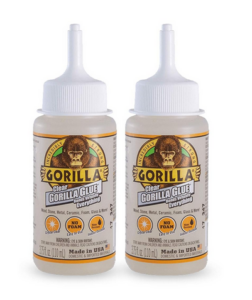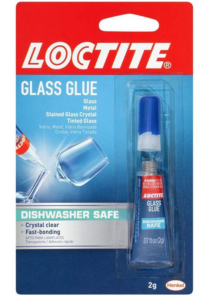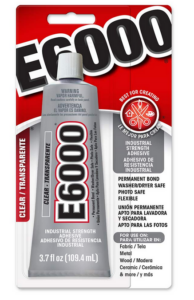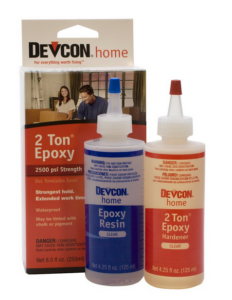Glass is a versatile material with unique properties and diverse applications. It is made from silica, a type of sand and other raw materials through heating and cooling processes. It forms an amorphous and non-crystalline structure once completed.
Glass is resistant to most chemicals except for strong acids. It has limited thermal resistance but acts as a strong insulator. There are many glass types, including soda-lime, borosilicate, tempered, fiberglass, and optical glass. Below we discuss the criteria for selecting the best glue for glass.
Criteria for Selection
Selecting the best glue for glass involves evaluating key criteria such as bonding strength, longevity, and toxicity. Glass is a smooth, non-porous material which presents some challenges for adhesives. Here, we delve into the critical factors you must consider before selecting a product.
-
Bonding Strength
The adhesive needs to provide a strong and permanent bond to ensure the pieces of glass remain securely attached and don’t slip away. Common choices for adhesives include cyanoacrylates, silicones, and UV-cured adhesives. For heavier glass pieces, look for a high-load bearing capacity which is found in epoxy-based glues.
-
Transparency
Since glass is transparent, the glue should dry clear and leave an invisible bond. This helps to ensure the aesthetics of the glass which is especially important in decorative glass, windows, and aquariums.
Additionally, you need to select an adhesive that does not yellow over time. UV-resistant adhesives provide prolonged clarity due to them resisting sunlight which can lead to chemical degradation.
-
Water Resistance
Glass is often used in environments where it is exposed to moisture. The adhesive you select must resist water to maintain its bond and prevent deterioration. Silicone and epoxy adhesives are generally water resistant and can withstand constant water immersion without weakening.
-
Temperature Resistance
Glass is used in a wide range of settings with varying degrees of exposure to fluctuating temperatures. Ideally, the adhesive should be able to withstand pressure from temperature extremes without causing bond failure.
-
Cure Time
Cure time is a practical consideration for projects that require quick results. Different adhesives vary in their curing time and some are slow while others are fast. Fast-setting glues are generally cyanoacrylates which are ideal for quick fixes. Slower-setting adhesives may take longer to cure but they offer superior strength and durability.
-
Flexibility and Shock Absorption
Glass is brittle and susceptible to breakage under stress or impact. Adhesives that provide a degree of flexibility can absorb shock and prevent cracks from spreading further. Silicone and polyurethane offer good protection and elasticity to absorb stress. For rigid applications, use a structural adhesive like an epoxy to hold glass in place.
-
UV-Resistance
The glass used in outdoor applications such as windows, solar panels, or decorative features is exposed to sunlight. This exposure can lead to degradation over time from the UV rays. For optimal performance outdoors or in projects where exposure to UV rays is the case, use UV-cured glues.
-
Safety and Toxicity
For applications where the glass will come into contact with food or drink items, use a food-safe or FDA-approved for use in human contact adhesive. Some adhesives emit harmful fumes, you ensure you have sufficient ventilation or protective gear when handling these glues.
-
Ease of Application
The adhesive’s ease of use is another key consideration. Some adhesives require an applicator bottle, and others require mixing before application. Another key consideration is viscosity because glue that is too runny may be difficult to control. Contrarily, a thicker adhesive may not spread evenly.
-
Longevity and Durability
For long-term applications, the glue should maintain optimal strength-resisting factors such as moisture, gaining, and thermal cycling.
Choosing the best glue depends on balancing these criteria based on your specific application. For structural application, bonding strength and temperature are key factors while for decorative projects, transparency and ease of use are of importance.
5 Best Glues for Glass
Selecting the right glue for glass can seem like a daunting task. Luckily, we’ve compiled a list of the 5 best adhesives for glass.
-
Gorilla Clear Glue

Gorilla Clear is a versatile adhesive known for its strong bonding capability. It has a transparent drying property making it suitable for transparent repairs.
The glue dries completely clear so there is little to no visual interference upon finish. It is also water-resistant but not waterproof so it cannot withstand prolonged exposure to water. Furthermore, it can handle moderate temperature ranges making it suitable for outdoor applications where temperatures are mild.
Application is also rather easy with the squeeze bottle which makes it easy to apply precisely. Overall, this glue is ideal for glass repairs, decorative glass items, and small household fixes.
-
Loctite Glass Glue

Loctite Glass Glue is a cyanoacrylate adhesive designed specifically for bonding glass to glass or glass to dissimilar materials like metal or plastic. It is a fast-setting formula and offers superior transparency.
It provides a strong and reliable bond that is water resistant. However, it is not suitable for load-bearing repairs or applications where stress or vibration are factors. It comes in a small precision tip tube for detailed applications. Overall, it is suitable for glassware repairs, and glass-to-glass bonding or small decorative glass projects.
-
E6000 Craft Adhesive

E6000 is a strong, industrial-grade adhesive popular among DIYers and construction professionals. Its flexibility and durability make it suitable for bonding glass under a variety of conditions. Firstly, it offers superior bonding strength which is capable of handling stress and load. Secondly, it has a rubber-like elasticity which can absorb shocks in high-impact predicaments. Thirdly, it is waterproof making it suitable for aquariums and other water-based applications. Fourthly, it can withstand high-temperature fluctuations like heat or cold. Lastly, it dries clear, providing an aesthetic and transparent professional finish.
The E6000 does have a longer curing time of up to 72 hours and it requires ventilation because of the strong fumes it emits during application.
-
Devcon 2-Ton Epoxy

The Devcon 2-Ton Epoxy is a two-part adhesive consisting of a resin and hardener that needs to be mixed before application. It offers incredible strength and durability and is a favorite for industrial and structural applications where a rigid and permanent bond is required.
Its bond strength allows for load-bearing stress, and it is also highly resistant to environmental factors such as moisture, chemicals, and UV exposure. It can withstand high and low temperatures, making it suitable for extreme conditions. Furthermore, it dries clear and offers a neat and professional finish.
Overall, this is a suitable adhesive if a rigid bond is required such as furniture, or outdoor glass structures.
-
Permatex 80050 Silicone Adhesive Sealant
![]()
The Permatex Silicone Adhesive Sealant is a highly flexible and waterproof adhesive suitable for sealing and bonding glass in wet or outdoor environments. It can handle temperature highs and lows and is capable of resisting UV exposure.
It provides a durable bond for non-load bearing applications. It is highly elastic, able to withstand stress or vibration without cracking. It is also 100% waterproof and resists cold and hot temperatures. Furthermore, it dries clear providing a clean transparent finish.
Overall, this is a suitable adhesive for applications such as window sealing or moderate glass repairs.
Conclusion
Overall, the best glue for glass is going to depend on your specific situation and the project on which you are applications working. Here is a general overview:
- For general-purpose repairs: Gorilla Clear Glue is the suitable option
- For precision and aesthetic repairs, Loctite Glass Glue is the premier choice
- For flexibility and shock absorption: E6000 Craft Adhesive works well
- For heavy-duty structural application: Devcon 2-Ton Epoxy delivers incomparable strength
- For waterproof and outdoor application: Permatex Silicone Sealant is the best
If you found this article useful in helping you select the best adhesive, please let us know by liking, sharing, or commenting on this post.